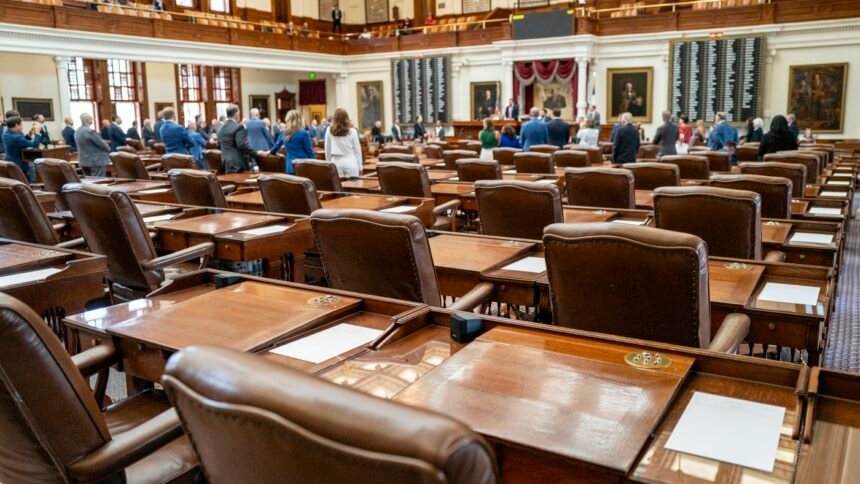MICHEL MARTIN, HOST:
In a Houston neighborhood, residents worry that their votes won’t matter, which means their problems won’t be heard. That’s if state lawmakers go ahead with a redistricting plan. At the urging of President Trump, Republicans want to redraw the lines for next year’s congressional elections to give them an edge. Houston Public Media’s Andrew Schneider talked to voters in an area where they could go from a district represented by Democrats to one that tilts Republican.
ANDREW SCHNEIDER, BYLINE: Houston’s Denver Harbor neighborhood is largely Latino and tends to vote Democratic. It’s a mix of small homes and small industry. One of the major concerns for residents has been deportations.
RENE PORRAS: Everybody’s nervous.
SCHNEIDER: That’s Rene Porras, a Vietnam combat veteran and small business owner.
PORRAS: I have a little local taqueria, Mexican bakery. Business is down. For the last three or four weeks, I mean really down. And I talk to my other friends that have businesses, and the same thing. Where did the immigrants go?
SCHNEIDER: Immigration is one of the big issues facing the congressional district. And for more than 30 years, it’s been represented by Democrats in the U.S. House – currently Sylvia Garcia. But if Republican state lawmakers get their way, as urged by President Trump, the neighborhood will be sliced off and melded to eastern suburbs and exurbs in a new congressional district. Porras says he’s angry.
PORRAS: Since Trump’s proposed this, he’s so unpopular around here. It’s incredible. Everything from cutting services and Medicaid, all the things he didn’t mention during the election or said he’s not going to cut – that’s exactly what he’s doing.
SCHNEIDER: Rita Robles, a community activist, says people in Denver Harbor don’t make much money compared to the neighborhoods it would be joined with in the new district.
RITA ROBLES: They make six figures – you know, anywhere from $50,000, $60,000 and up to six figures. They don’t have these type of problems that we do.
SCHNEIDER: An analysis by the Texas Legislative Council, an agency that does research for lawmakers, shows that while the current district voted for Kamala Harris for president last year, voters who would be in the new district went for Donald Trump by a wide margin. But Republicans note that while Denver Harbor’s current district twists and turns across Houston, its proposed new home is more compact. And it will still be majority Hispanic, even though Democratic leaders might not like how they vote. Cindy Siegel chairs the Harris County Republican Party.
CINDY SIEGEL: They know that there has been a shift in the last election, that the Hispanic community – more Hispanic voters in fact supported President Trump, voted for him.
SCHNEIDER: And some Republicans say they are seeking a partisan gain.
TOM OLIVERSON: I think it’s well within our right to do so.
SCHNEIDER: Texas House Majority Leader Tom Oliverson, who represents northwest Harris County, spoke with Houston Public Media.
OLIVERSON: There are many, many states where redistricting for partisan performance has been a way of life for 20, 30 years, particularly in Democrat states.
SCHNEIDER: But partisan redistricting can overlap with racial gerrymandering, which is illegal. Michael O. Adams is a political science professor at Texas Southern University.
MICHAEL O ADAMS: I think what we’re seeing here and what we’re witnessing in this redistricting proposal in the midterm cycle is what I would call a master class in demographic manipulation.
SCHNEIDER: That’s what it seems like to some people in Denver Harbor, including Rene Porras. He hopes other states will give Democrats an advantage so they can fight for his issues.
PORRAS: This has got to be stopped. I don’t know how. And I’m against gerrymandering, OK? But if Texas does it, then I’m all for California and Massachusetts and Illinois doing the same thing.
SCHNEIDER: California’s governor, Gavin Newsom, has said that if Texas redistricts, he’ll ask voters to approve new congressional districts in his state, with the aim of picking up seats for Democrats.
For NPR News, I’m Andrew Schneider in Houston.
(SOUNDBITE OF WILLIAM RYAN FRITCH’S “SIRI SONG/REACQUAINT”)
Copyright © 2025 NPR. All rights reserved. Visit our website terms of use and permissions pages at www.npr.org for further information.
Accuracy and availability of NPR transcripts may vary. Transcript text may be revised to correct errors or match updates to audio. Audio on npr.org may be edited after its original broadcast or publication. The authoritative record of NPR’s programming is the audio record.











